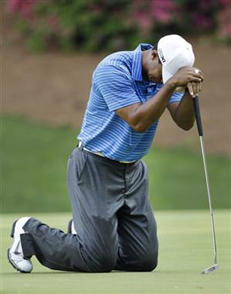The ball is about 20 cm from the hole. The grass is smooth. There is no wind, it is not raining, and you have done this hundreds of times before. A gentle tap and you sink the ball. Just as you would expect from looking at the picture below.

Now replay the scenario in your mind but imagine that there are 13 million people watching you, that you are one of the world’s best players but have made a few mistakes recently, and that the purse for this competition runs in the millions of dollars.
What will happen? Maybe you will sink the ball, but maybe you’ll end up like Tiger Woods in the picture below.

This failure to perform at one’s usual level when the stakes are enormous is what’s known as choking under pressure. There has been considerable scholarly attention devoted to this issue over the years, with at least one book being published about choking. Choking can have fairly serious consequences on people’s lives, as for example when we fail an exam despite being well-prepared and despite having mastered the material.
One of the most intriguing findings concerning choking is that it affects those people most who, in the absence of pressure, would be expected to have the highest potential for success. People with a greater working memory capacity (WMC) are more likely to choke under pressure than people whose WMC is smaller.
Why?
Working memory capacity is known to explain half of people’s variation in IQ, and it is also known to be related to executive attention; that is, the ability to fluidly shift attention between competing task demands. Indeed, on one theoretical view of working memory, WMC is (nearly) synonymous with executive attention. So why are people who are better able to allocate their attention more susceptible to choking than people with lesser attentional abilities?
A recent article in the Psychonomic Bulletin & Review shed some light on this apparent paradox. The research team, led by Clément Belletier from the Aix-Marseille Université in France, created the conditions for choking in the laboratory by having the experimenter observe participants during performance of a task. Although this may appear innocuous, there is a long empirical history of this manipulation: student participants generally view the experimenter as an expert, and being watched by the experimenter (rather than a fellow student), thus creates a certain amount of pressure.
Belletier and colleagues reasoned that: “Ironically, the individuals with higher WMC are precisely those who are most able to attend simultaneously to both the focal task and the experimenter presence (i.e., to experience distraction/conflict), and thus the most susceptible to choke on tasks requiring executive attention when the person present is the experimenter.”
So being able to allocate attention may be to your detriment if it is allocated to a source of potential pressure that is best ignored.
Belletier and colleagues first measured participants’ WMC before they trained participants in an executive attention task, known as the “Simon task.” In the Simon task, people are instructed to press a key on the right-hand side if they see a green stimulus, and a key on the left if they see a red stimulus (or vice versa). The reason this task measures attention is because the stimuli appear on the right or left of the screen at random: even though location is to be ignored, responding is slowed when the green stimulus appears on the left and the red stimulus on the right (i.e., the location is opposite to the mapping of response keys to color).
After training on this task, participants returned to the laboratory for a second session during which they performed the Simon task again under one of three conditions. In the “alone” condition they did the Simon task once more on their own. In the “peer” condition, another student was present who observed the participant from across the table. Finally, in the “experimenter” condition, the experimenter was present and again observed the participant from across the table.
The analysis focused on the magnitude of the slowing that was observed when the location of the stimulus was in conflict with the location of the associated response key. Belletier and colleagues found that this slowing—known as the “Simon effect”—was magnified by the mere presence of the experimenter. People’s attentional abilities were disrupted when they thought their performance was being evaluated by an expert, even though they were explicitly told that there was no pressure to perform particularly well in the task.
Of even greater interest was the effect of the experimenter’s presence on therelationship between WMC and the Simon effect. In the “alone” condition, this relationship was negative: that is, greater WMC was associated with lesser interference from the stimulus-location incompatibility. This result is exactly as expected on the view that working memory and executive attention are closely related. In the “experimenter” condition, intriguingly, that association was reversed: the greater one’s WMC, the more executive attention appeared to be disrupted by the experimenter’s presence. This result is also as expected under the hypothesis that attentional ability opens the door to something that is best ignored.
Belletier and colleagues conclude that choking in an attention demanding task is not limited to situations in which people are distracted by outcome pressures (i.e., the millions of dollars you earn by sinking that ball in the hole) and related worries. Choking may arise even if the stakes are low, simply because an expert is present.
Maybe that explains why some spouses never manage to stack the dishwasher properly when their partner is watching.

2 Comments